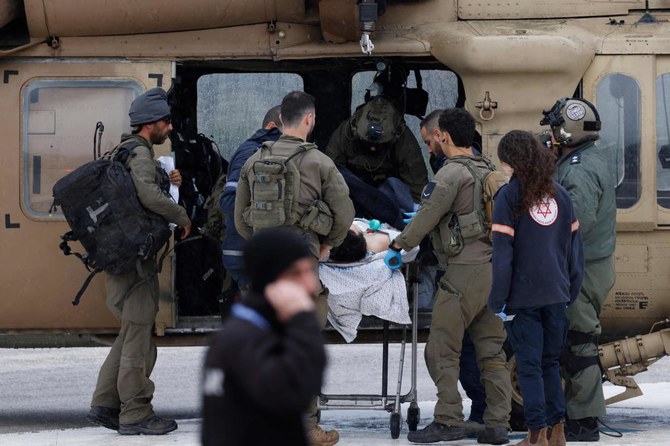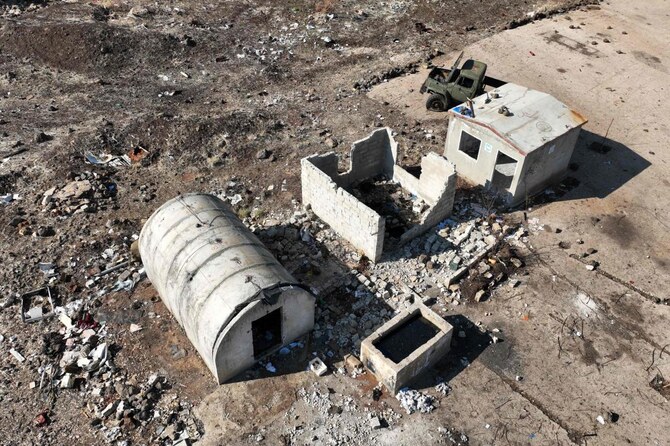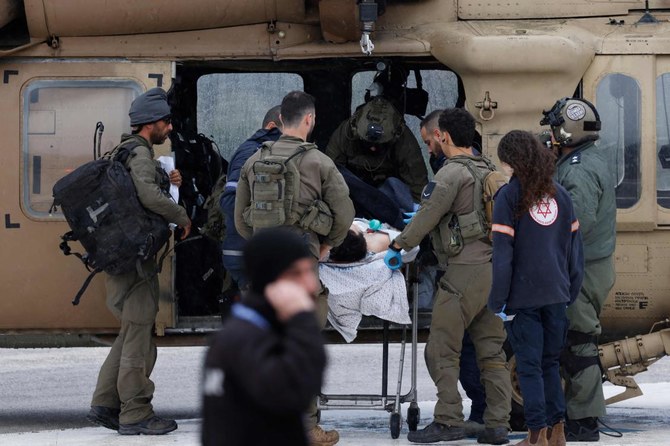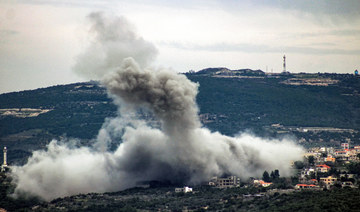SAFED, Israel: On a clear day, the view south from Safed, high in the mountains of northern Israel, stretches uninterrupted across orange groves and orchards to the Sea of Galilee.
But all eyes in the historic city have been trained more recently on the jagged hills just a few kilometers (miles) away to the north — and the border with Lebanon.
On Wednesday, an Israeli soldier was killed in a rocket strike in Safed, prompting retaliatory air strikes inside Lebanon that left at least 15 dead, including 10 civilians.
It was the worst single-day civilian death toll in Lebanon since cross-border hostilities began in October, stoking fears of a broader conflict between Israel and the Lebanese militant group Hezbollah.
On Thursday, Israeli jets roared overhead, unseen in heavy cloud, as Safed’s Artists’ Colony in the city’s old Arab quarter slowly opened for business.
Further up the valley, locals nervously glanced at the skies, rumbling with thunder and flashes of lightning. Then an explosion echoed over the hills.
Israel’s military later said it had hit a “Hezbollah military structure” in southern Lebanon.
Wrapped up against the cold in Safed — also known as Israel’s “City of Air” — about 900 meters (3,000 feet) above sea level, Arie Buznah said he was used to the flurry in military activity.
“Here in Israel... we’re not living a full, relaxing, peaceful, human, normal life,” the 66-year-old tour guide explained.
“You have to be ready. You have to be alert, 24 hours a day, 365 days a year,” he told AFP.
This week’s attack — and the reprisal — was a clear sign, said Buznah. “The war is escalating,” he said.
Nearby, Abbi Shachar nodded in approval. “People have been saying to me for weeks upon weeks that it’s about to happen,” she said.
On Wednesday, she was with the youngest of her two daughters, aged seven and 10, when sirens sounded for the incoming rocket attack, sending them to safety in a shelter.
The 47-year-old gallery owner who moved to Safed 30 years ago from Westchester, New York, said she hoped a wider conflict can still be averted.
“I just believe in my heart that something will stop it maybe but if not we’ll have to deal with it,” she added.
Safed is about 250 kilometers (155 miles) from the Gaza Strip, where Israel is waging war with the Palestinian militant group Hamas after its deadly October 7 attack against Israel.
Hamas is an ally of Hezbollah, and both are backed by Israel’s arch-foe Iran.
For Buznah, too, the Hamas attack has a particular resonance. It resulted in the deaths of at least 1,160 people, according to an AFP tally based on Israeli figures, and around 250 people taken hostage.
Nearly 50 years ago, in May 1974, Buznah was a 16-year-old schoolboy on a hiking trip in Maalot, western Galilee, when Palestinian militants took him and dozens of his classmates hostage.
Israeli commandos eventually stormed the school where they were being held, killing the hostage-takers but not before more than 20 people, most of them children, were killed.
Buznah, his knee grazed by a bullet, escaped through a window.
The latest hostage drama has brought memories flooding back for Buznah but also convinced him of the need to settle the conflict once and for all — both with Hamas in Gaza and Hezbollah in Lebanon.
“In the Gaza Strip, I would give it (Israeli military action) three to five months, maybe half a year, six months,” he said of the war that has left nearly 29,000 dead, according to the health ministry in the Hamas-run territory.
“Then we are going to come to Lebanon... We don’t have any other choice.”
Like Shachar, Buznah remembers 2006, when Israel fought Hezbollah in the north until a United Nations-brokered ceasefire brought an uneasy peace.
Lebanon and Hezbollah had not respected UN Security Council Resolution 1701 that halted the war, and instead moved back into the buffer zone on the border within weeks, he said.
The time for negotiating is over, he said. “It’s not going to work, simple as that,” he added.
In Israel’s northern hills, all eyes look to Lebanon
https://arab.news/mff77
In Israel’s northern hills, all eyes look to Lebanon

- All eyes in the historic city have been trained more recently on the jagged hills just a few kilometers away to the border with Lebanon
- Israel’s military later said it had hit a “Hezbollah military structure” in southern Lebanon
Syria monitor reports blasts at arms depots near Damascus

The Syrian Observatory for Human Rights monitor said the blasts in Kisweh, south of the Syrian capital, may be the result of an Israeli air strike.
The Israeli military, which has struck many military sites in Syria in recent weeks, told AFP in Jerusalem it did not attack the site.
The Britain-based Observatory, which has a network of sources in Syria, said that “loud blasts resonated in the wider capital area.”
The explosions occurred “at ammunition depots of the former regime forces... near the town of Kisweh,” sending a thick cloud of smoke billowing over the site, the Observatory said.
Israel, which rarely comments on its actions in neighboring Syria, has carried out hundreds of air strikes on military sites since Islamist-led forces ousted president Assad and seized Damascus last month.
Israel has said it was seeking to prevent weapons from falling into hostile hands.
Most recently, the Observatory said Israeli war planes hit sites of the now defunct Syrian army in the Aleppo area on Friday.
In late December, the Observatory said 11 people died in an explosion at an arms storage facility in the Adra area north Damascus, adding that it was possibly the result of an Israeli strike. Israel denied any involvement.
Israel releases Jordanian doctor detained during relief mission to Gaza

- Jordan engaged in ‘intensive’ diplomatic efforts to secure release of Abdullah Balawi
- Balawi said his mission as a doctor is to relieve those who need help
LONDON: Israeli authorities released Abdullah Balawi, 38, a Jordanian doctor who had been detained in December while attempting to cross into the Gaza Strip to take part in a medical relief mission.
Spokesperson for the Ministry of Foreign and Expatriates Affairs Sufian Al-Qudah said that Jordan engaged in “intensive” diplomatic efforts via the kingdom’s embassy in Tel Aviv to secure the release of Balawi on Sunday, according to the Petra agency.
Israeli authorities arrested Balawi on Dec. 19 at Allenby crossing, also known as Sheikh Hussein Bridge, which borders Jordan with the Occupied West Bank.
He was returned through diplomatic channels at the Sheikh Hussein Bridge on Sunday, with Jordanian Embassy staff present, Petra added.
Balawi told Al-Mamlaka TV after his release that his mission as a doctor is to relieve those who need help. His family could not contact him for 11 days during his detention in Israel.
Al-Qudah said that Amman closely monitored Balawi’s detention and contacted his family.
Since October 2023, Jordan has launched several medical, airlift and aid relief missions to assist Palestinians in the Gaza Strip.
Some of these missions have been supervised personally by King Abdullah in response to Israeli military operations that have damaged multiple hospitals in Gaza and resulted in almost 45,000 deaths.
Israel helps former soldier leave Brazil over investigation into alleged war crimes in Gaza

- The Hind Rajab Foundation filed a complaint of alleged war crimes based on video footage, geolocation data and photographs
- Israel adamantly rejects the international allegations, saying its forces in Gaza are acting in accordance with international law
JERUSALEM: Israel has helped a former soldier leave Brazil after legal action was initiated against him by a group accusing Israelis of war crimes in the Gaza Strip based in part on soldiers’ social media posts.
Israel’s Foreign Ministry on Sunday said it had helped the former soldier safely leave Brazil on a commercial flight after what it described as “anti-Israel elements” sought an investigation last week. It warned Israelis against posting on social media about their military service.
The Hind Rajab Foundation, named for a 5-year-old Palestinian girl killed in Gaza, said Brazilian authorities had launched an investigation into the soldier after it filed a complaint based on video footage, geolocation data and photographs showing him taking part in the demolition of civilian homes.
The foundation described the move as a “pivotal step toward accountability for crimes committed in Gaza” during nearly 15 months of war.
There was no immediate comment from Brazilian authorities. Brazilian media reported Saturday that the investigation was ordered by an on-call federal judge in Brazil’s Federal District. The decision was issued on Dec. 30 but first reported over the weekend.
Israel has faced heavy international criticism over its war against Hamas in Gaza, with the International Criminal Court issuing arrest warrants for Prime Minister Benjamin Netanyahu and his former defense minister. The International Court of Justice is separately investigating genocide allegations.
The Brazil case raised the prospect that rank-and-file Israeli troops could also face prosecution while traveling abroad.
Israel adamantly rejects the international allegations, saying its forces in Gaza are acting in accordance with international law and that any violations are punished within its judicial systems. It blames Hamas for civilian deaths, saying the militant group conceals tunnels and other infrastructure in residential buildings, necessitating their demolition.
Throughout the war, Israeli soldiers have posted numerous videos from Gaza that appear to show them rummaging through homes and blowing up or burning residential buildings. In some, they chant racist slogans or boast about destroying the Palestinian territory.
The military has pledged to take disciplinary action in what it says are a handful of isolated cases.
The war began when Hamas-led militants stormed into southern Israel on Oct. 7, 2023, killing some 1,200 people, mostly civilians, and abducting around 250. Some 100 hostages are still inside Gaza, at least a third believed to be dead.
Israel’s offensive has killed over 45,800 Palestinians in Gaza, according to local health officials. They say women and children make up over half the dead but do not distinguish between civilians and militants. Israel says it has killed over 17,000 militants, without providing evidence.
Israeli airstrikes on Sunday killed five people in the Nuseirat refugee camp in central Gaza and four in the southern city of Khan Younis, according to health workers. Gaza’s Health Ministry said at least 88 people had been killed in the past 24 hours.
The war has caused widespread destruction in Gaza and displaced around 90 percent of the population of 2.3 million people, with many forced to flee multiple times.
Israeli forces kill Palestinian security member
In the Israeli-occupied West Bank, Israeli forces killed a member of the Palestinian security services, calling him a wanted militant.
Israel’s paramilitary Border Police said Sunday they carried out an operation in Meithaloun village overnight to arrest Hassan Rabaiya. They said he was killed in a shootout while trying to escape.
Israeli authorities released helmet-cam footage that showed the police shooting the suspect and blowing up what police said was an explosives lab in his home.
The Palestinian security services identified Rabaiya as a first lieutenant in its Preventive Security force, saying he was killed while “performing his national duty.”
Meithaloun is near the West Bank city of Jenin, an epicenter of Israeli-Palestinian violence in recent years. The Palestinian Authority has been waging a rare crackdown on militants in Jenin, angering many Palestinians.
The internationally recognized Palestinian Authority exercises limited autonomy in parts of the West Bank and cooperates with Israel on security matters. But Israel has long accused it of inciting violence and turning a blind eye to militants, while Palestinian critics view it as a corrupt and ineffective body that aids the occupation.
The West Bank has seen a surge of violence during the war in Gaza. Israel captured both Gaza and the West Bank, as well as east Jerusalem, in the 1967 Mideast war, and the Palestinians want all three territories for their future state.
Israel warns that ceasefire in Lebanon is at risk
Israel’s defense minister warned Sunday that the truce that ended more than a year of fighting with Lebanon’s Hezbollah is at risk.
Israel Katz said the agreement requires Hezbollah to withdraw to the north of the Litani River and Lebanese troops to eliminate militant infrastructure in the buffer zone — “something that hasn’t happened yet.”
“If this condition is not met, there will be no agreement, and Israel will be forced to act on its own to ensure the safe return of the residents of (Israel’s) north to their homes,” he said.
Both sides have accused the other of violating the ceasefire agreement. Israel has withdrawn from just two of the dozens of towns it holds in southern Lebanon. And it has continued striking what it calls Hezbollah targets, accusing the militant group of attempting to launch rockets and move weapons before they can be confiscated and destroyed.
The deal struck on Nov. 27 required Hezbollah to immediately lay down its arms in southern Lebanon. It gave Israel 60 days to withdraw its forces and hand over control to the Lebanese army and UN peacekeepers.
Hezbollah, severely degraded after Israeli strikes, has threatened to resume fighting if Israel does not fully withdraw its forces by the 60-day deadline.
Syrian caretaker government to hike public sector salaries by 400 percent next month

- The increase will be financed by existing state resources plus a combination of regional aid, new investments, and efforts to unfreeze Syrian assets held abroad
DAMASCUS: Syria’s finance minister said on Sunday the government would hike salaries for many public sector employees by 400 percent next month after completing an administrative restructuring of ministries to boost efficiency and accountability.
The increase, estimated to cost 1.65 trillion Syrian pounds, or about $127 million at current rates, will be financed by existing state resources plus a combination of regional aid, new investments, and efforts to unfreeze Syrian assets held abroad.
“(This is) the first step toward an emergency solution to the economic reality in the country,” Mohammed Abazeed, the finance minister in Syria’s caretaker government, told Reuters, adding that this month’s wages for public sector staff would be paid out this week.
Israel blocks food supply to northern Gaza’s Indonesian hospital to force out doctors

- Patients, doctors forced out from Kamal Adwan hospital are sheltering in Indonesia Hospital
- The facility has been sheltering critically ill patients with no electricity, water, UN says
JAKARTA: Israeli forces have blocked food and water supply to the Indonesia Hospital in northern Gaza to force out the doctors who are refusing to leave their patients behind, the nongovernmental organization that funded it said on Sunday.
The hospital in Beit Lahiya, a four-story building located near the Jabalia refugee camp, was built from donations organized by the Jakarta-based Medical Emergency Rescue Committee.
It has been sheltering more than a dozen patients, caregivers and health workers from Gaza’s Kamal Adwan hospital, which was destroyed in December after months of relentless Israeli attacks.
The remaining doctors are defying orders to leave the Indonesia Hospital, MER-C said, adding that they last received food aid from the UN Office for the Coordination of Humanitarian Affairs.
“They are still holding out. The condition is deteriorating, there’s a lack of water and food,” Marissa Noriti, a MER-C volunteer in Deir el-Balah in central Gaza, told Arab News via WhatsApp.
“The Israeli occupation forces are blocking supply … The doctors are staying for the patients. They refuse to leave them behind.”
Indonesia Hospital is no longer in service after it was severely damaged by frequent Israeli attacks since October 2023. But the facility was still sheltering critically ill patients, despite not having electricity, water or supplies, according to UNOCHA.
The hospital operated under limited capacity last year, but Israeli bombardments forced the patients and medical staff to transfer to the Al-Shifa hospital in southern Gaza last December, with only a few doctors staying behind.
On Friday, as the hospital was surrounded by Israeli forces attacking the area, the doctors were ordered to leave the facility and the patients.
“We are monitoring the situation. Israel’s occupation forces are cutting off all supplies to force them out; this is their strategy to empty north Gaza, to empty all the hospitals in the north so the people have no place to go to seek help,” Sarbini Abdul Murad, chairman of MER-C’s board of trustees in Jakarta, told Arab News.
“We ask that the international community act by any means to save Palestine from the crimes of the IDF (Israel Defense Forces).”
Israel has frequently targeted medical facilities in the Gaza Strip, saying that they are used by Palestinian armed groups. The attacks have pushed the enclave’s healthcare system to the brink of collapse.
Israel’s war on Gaza has killed more than 45,000 Palestinians and wounded over 108,000 since Oct. 7, 2023. The real death toll is believed to be much higher, with estimates published by medical journal The Lancet indicating that, as of July, it could be more than 186,000.





















